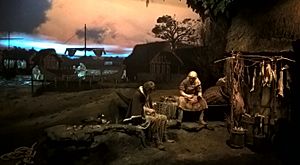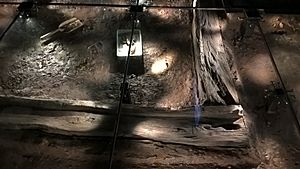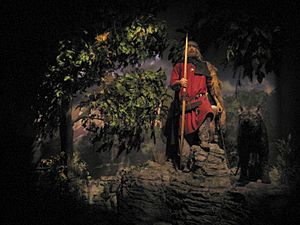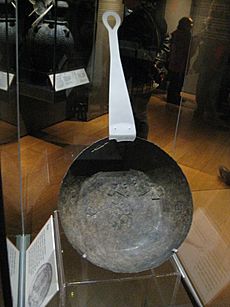Jorvik Viking Centre facts for kids
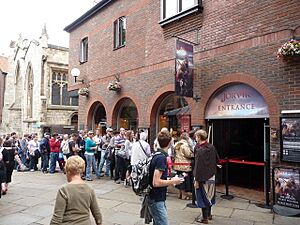 |
|
| Established | 1984 |
|---|---|
| Location | York, England |
The Jorvik Viking Centre is a popular museum and visitor attraction in York, England. It brings the Viking city of Jorvík to life with realistic models and scenes. Visitors ride in special 'time capsule' carriages through these scenes. The centre was created by the York Archaeological Trust and first opened in 1984. Its name, Jorvik, comes from Jórvík, which was the Old Norse name for York during the Viking Age.
Contents
Discovering Viking York
In the late 1970s, something amazing happened in York. Before a new shopping centre was built, archaeologists from the York Archaeological Trust started digging. They found the incredibly well-preserved remains of the Viking city of Jorvík!
The ground in this area was very wet and lacked oxygen. This special condition helped to preserve things that usually rot away. They found timber buildings, workshops, fences, and even animal pens. They also uncovered everyday items like pottery, metal tools, and bones. What was truly special was finding wood, leather, textiles, and even plant and animal remains from around 900 AD. In total, over 40,000 objects were found!
These discoveries showed what life was really like in Viking York. The York Archaeological Trust decided to rebuild part of the excavated area right on the spot. They added lifelike figures, sounds, and even smells to make the Viking city feel real. The Jorvik Viking Centre was designed to let people experience this ancient world. It opened its doors in April 1984.
Jorvik in the 21st Century
The Jorvik Viking Centre has been updated several times to make the experience even better. In 2001, it had a big makeover, and again in 2010. These updates added more technology and special effects. The ride became longer, and new sensory elements were added, like smells, sounds, and even changes in temperature.
After these updates, visitors would travel back in time to a specific moment: 5:30 PM on October 25, 960 AD. The time-capsule ride would then take them through a reconstructed Viking settlement. This included realistic animated figures, some created using laser technology based on actual Viking skeletons found at the site.
In December 2015, the centre was badly damaged by floods. Many valuable Viking artifacts had to be moved to keep them safe. After a lot of repair work, the museum reopened in April 2017. The timeline of the ride was changed, so visitors now experience a September day in 975 AD. The ride was also slowed down, making it 16 minutes long. Some of the animated characters even speak in Old Norse, voiced by researchers!
By October 2022, the Jorvik Viking Centre had welcomed an amazing 20 million visitors.
Beyond the ride, there is a large museum area. Here, you can see about 800 real objects found during the excavations. There are also interactive displays where you can learn more about life in the tenth century. You can even chat with staff dressed as Vikings! One special item on display is a copy of the Coppergate Helmet. The original helmet was found near the centre and is now in the Yorkshire Museum.
Viking Models
The lifelike figures you see at Jorvik were created by artist Graham Ibbeson. At first, the faces of these models were based on modern people. However, thanks to new technology that can reconstruct faces from skulls, eight new models were created. Their faces are based on skulls found in a Viking-age cemetery.
Viking Festival
The Jorvik Viking Centre also organizes the annual JORVIK Viking Festival. This exciting event takes place in the second week of February. The festival is inspired by an ancient Viking celebration called "Jolablot." It includes thrilling combat re-enactments with volunteers from all over the world.
Influence on Other Attractions
The Jorvik Viking Centre is not just a museum; it's an "experience." This type of educational journey into the past, sometimes called a "Time Warp" experience, became very popular after Jorvik opened. It inspired other attractions, like "The Canterbury Tales," where visitors could join Geoffrey Chaucer's famous pilgrimage.
See also
 In Spanish: Jorvik (museo) para niños
In Spanish: Jorvik (museo) para niños
- The Lloyds Bank coprolite is a unique fossilized Viking poo that is displayed at the centre.
 | Chris Smalls |
 | Fred Hampton |
 | Ralph Abernathy |


